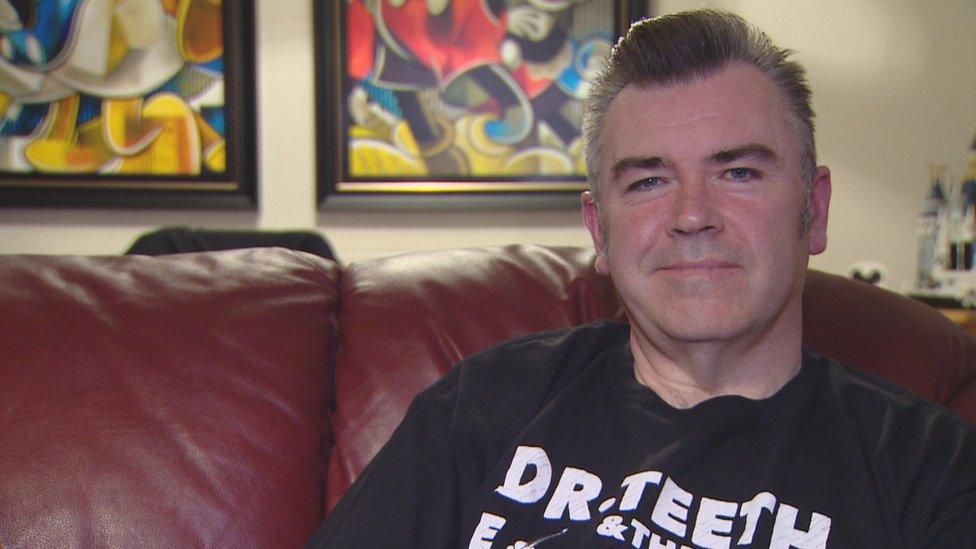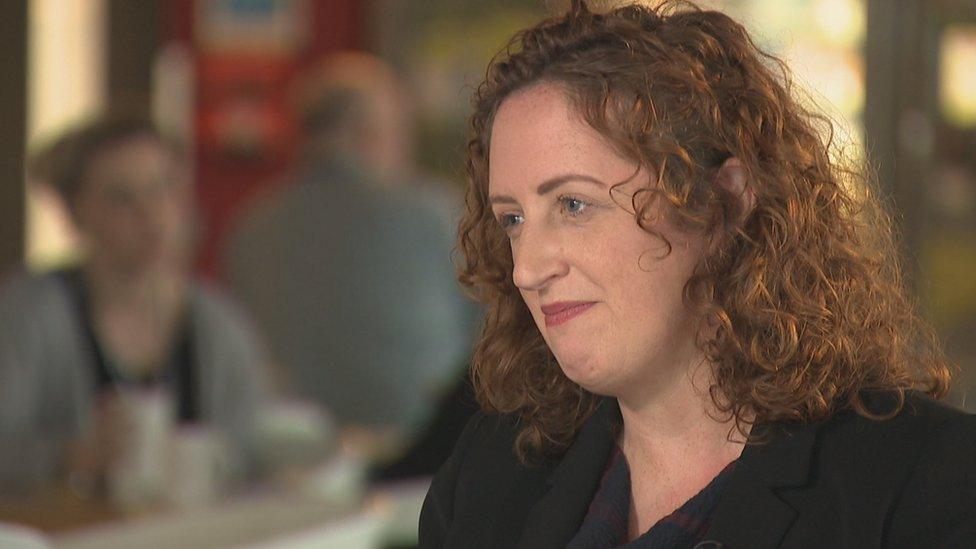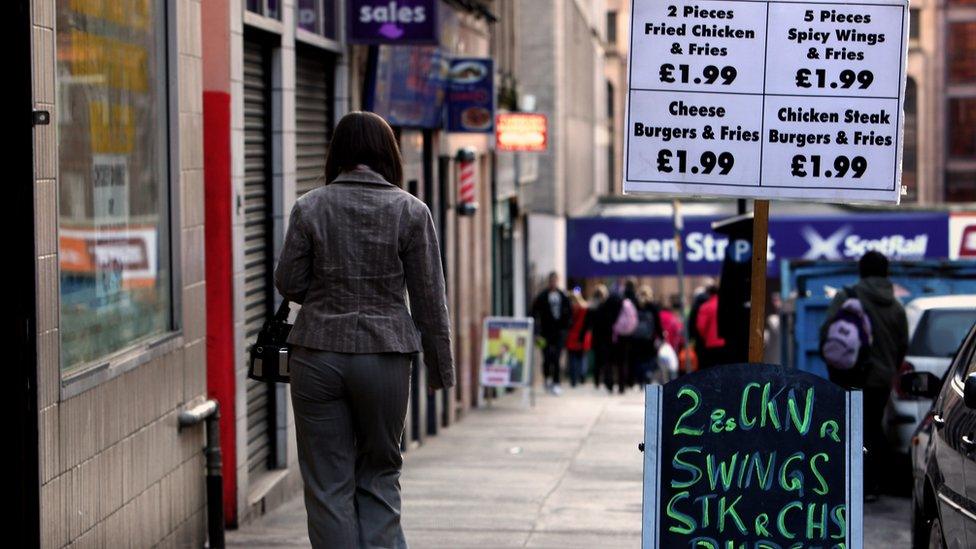'You are never far from a sausage roll'
- Published
"It was just a vicious cycle."
People who have a healthy weight are in the minority in Scotland. Almost two-thirds of adults are overweight or obese. Why?
The average BMI (body mass index) of Scottish adults is 27.7, which is classed as overweight. Despite years of attempts to tackle the problem the figure shows no sign of coming down.
There are countries with a higher rate but the fact remains that only a third of Scots adults maintain a healthy weight and educational messages are not getting through.

'It is just so accessible'

Stephen Orr lost weight after a health scare
For Stephen Orr it took a health scare to convince him he needed to take action.
He weighed 25st (160kg) but had been unable to get his weight down until medication for high blood pressure resulted in heart arrhythmia. Stephen, 46, says being in hospital attached to a heart monitor "scared me straight".
"I had to own my mistake," he says. "This was all my fault and at that point I made the decision that enough was enough."
Stephen's biggest problem was that he was eating too much and the wrong things.

Stephen had been 25st before he lost weight
He says he ate three meals a day but he also had high-calorie snacks in-between from fast food outlets.
"It is just so accessible," he says. "You are never short of a sausage roll if you need one."
Stephen, from Erskine in Renfrewshire, has lost 9st (57kg) by working on a Weightwatchers programme that tracks calorie intake on a phone app.
"It is not brain surgery," he says. "If you stay within your tolerance then you will lose weight."
"I eat a lot more fruit and veg than I used to. When you look at your dinner it is much more interesting and fills you up for longer.
"I used to say 'I'm not a rabbit, so I don't eat rabbit food' but you know what, some of that rabbit food is pretty damn tasty."

Obesity facts
In 2018, two-thirds (65%) of adults were overweight in Scotland, according to the latest official Scottish Health Survey, external.
This includes 28% who were obese.
About a third adults were a healthy weight (a BMI of 18.5 to less than 25).
There has been a small upward trend in people being overweight in recent years.
Average BMI rose from 27.1 in 2003 to 27.7 in 2018.
The prevalence of children at risk of obesity has remained relatively stable at 16%.

International comparisons
Scotland's figure of 27.7% of adults being obese is above the figure for the UK (26.2).
The Scottish figure is higher than many other European countries such as Germany (24%), Ireland (23%) France (17%) and Norway (12%).
But it is lower than countries such as the USA (40%), Chile (34%) and Mexico (32%).
Some countries, such as Japan (4%) have extremely low levels of obesity.

Why are so many Scots overweight?

Too few Scots eat enough vegetables
"We have created a food environment where it is much easier to make the unhealthy choice," according to Lorraine Tulloch from Obesity Action Scotland.
She cites advertising, portion sizes and special offers as encouraging people to buy the wrong kind of food.
"We know across Scotland we have a very poor diet as a nation. Those dietary habits are ingrained. We have been missing our dietary targets now for 17 years or more."
The latest health survey says just 22% of Scottish adults, and even fewer children, manage the recommended five portions of fruit and vegetables a day.
Scots are also not eating enough fibre or oily fish but are consuming three times the amount of sugar that is recommended.
Another problem is an increasing trend for eating out-of-home and online takeaway deliveries.
She said consumers eating out were often "blind" to the detail of the nutritional value or the calorie content of the meal.
In 2018 Obesity Action did a survey of chip shops in an area of Glasgow and found the average bag of chips contained half the daily calorie intake that is recommended for a woman.

What can be done?

Dr Catherine Calderwood thinks more needs to be done to change the food environment
Scotland's chief medical officer, Dr Catherine Calderwood, says starting food education in school is a good place.
She says the combination of free school meals for the first years of primary school and the "reformulated" menu that includes less red meat and more fruit and veg is a good way to get children into positive food habits.
Ms Calderwood also points to the sugar tax as a successful way of reducing the amount of sugar in drinks.
"Before that, voluntary did not really have an impact," she says. "We have seen that legislation has made a big difference."
She thinks much more needs to be done to change the environment that promotes cheap, high-calorie foods that are full of sugar, salt and fat - and that might again require legislation.
"I would like to see the supermarket promotions for the unhealthy stuff removed," she says.

Lorraine Tulloch of Obesity Action Scotland says education is not enough
Lorraine Tulloch from Obesity Action Scotland agrees.
"Education alone is not enough," she says.
She wants both the UK government and the Scottish government to take action to make it the "default option" to make the healthy choice.
The UK government holds reserved powers for advertising, she says.
She wants a 9pm watershed on advertising for unhealthy foods to ensure they are not targeted at children.
Ms Tulloch says the Scottish government could control special offers in stores, as well as multi-buys and price reductions, in an approach similar to the one taken on alcohol.
She says the Scottish government could also enable improvements in the out-of-home sector such as not promoting unhealthy foods and providing more information about what people are purchasing such as calorie content.
Another problem with the out-of-home sector is portion sizes.
Ms Tulloch wants more healthy options and the choice of smaller portion sizes at the correct price.
"Just now the price differential between portion sizes encourages you to eat more," she says.
"We would like to see that change."
- Published9 August 2018
